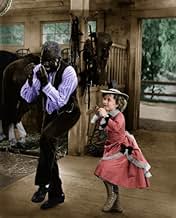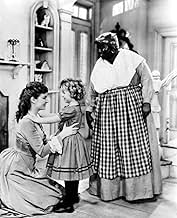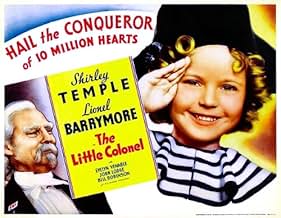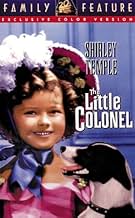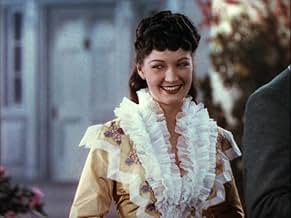In the post-Civil war south, a darling little girl attempts to restore the peace between her parents and her plantation owner grandfather.In the post-Civil war south, a darling little girl attempts to restore the peace between her parents and her plantation owner grandfather.In the post-Civil war south, a darling little girl attempts to restore the peace between her parents and her plantation owner grandfather.
- Director
- Writers
- Stars
- Awards
- 2 wins & 1 nomination total
Stephen Chase
- Hull
- (as Alden Chase)
C.E. Anderson
- Overseer
- (uncredited)
Martin Faust
- Frontiersman
- (uncredited)
Rolland Hamblen
- Trooper Doing Egg Trick
- (uncredited)
Frank Hammond
- Carriage Driver
- (uncredited)
- Director
- Writers
- All cast & crew
- Production, box office & more at IMDbPro
7.02K
1
2
3
4
5
6
7
8
9
10
Featured reviews
Okay, But Weaker Of Two Civil War Efforts Of 1935
It's odd that Shirley Temple made two similar movies in the same year, both involving Civil War-type story lines and her character being very similar. "The Littlest Rebel" took place during the Civil War and "The Little Colonel" took place right after the war.
For some reason, I get an extra feeling being choked up seeing Shirley melting a crabby old man's heart as she did in some of her films, this being one of them. Here, it's Lionel Barrymore who was fun to watch in any film.
The lead female role was played by Evelyn Venable and she really wasn't up to the standards, beauty-wise, set by previous Temple adult feminine leads such s Gloria Stuart, Karen Moreley, Rochelle Hudson, etc. But, that's not important.
The story was more important and in case - surprise - I found this to run a distant second to the aforementioned "The Littlest Rebel." This movie was, frankly, boring in comparison.
I am not one of the crying Liberals who boycott Temple''s films because blacks in these movies were denigrated. Unfortunately, that's what you saw in 1930s films....and what's done is done. However, the black characters in here are just plain treated embarrassingly bad. Everyone's Mr. Nice Guy (mine, too) Bill Robinson, didn't come on the scene and dance with Shirley until later in the film when I had lost interest.
Temple, meanwhile, is so cute that she's even likable when she's a brat, as she acts several times with the old man (but apologizes later for her behavior).
It's still a good film but I prefer the "Rebel" over the "Colonel" in the battle of these 1935 Civil War-themed stories.
For some reason, I get an extra feeling being choked up seeing Shirley melting a crabby old man's heart as she did in some of her films, this being one of them. Here, it's Lionel Barrymore who was fun to watch in any film.
The lead female role was played by Evelyn Venable and she really wasn't up to the standards, beauty-wise, set by previous Temple adult feminine leads such s Gloria Stuart, Karen Moreley, Rochelle Hudson, etc. But, that's not important.
The story was more important and in case - surprise - I found this to run a distant second to the aforementioned "The Littlest Rebel." This movie was, frankly, boring in comparison.
I am not one of the crying Liberals who boycott Temple''s films because blacks in these movies were denigrated. Unfortunately, that's what you saw in 1930s films....and what's done is done. However, the black characters in here are just plain treated embarrassingly bad. Everyone's Mr. Nice Guy (mine, too) Bill Robinson, didn't come on the scene and dance with Shirley until later in the film when I had lost interest.
Temple, meanwhile, is so cute that she's even likable when she's a brat, as she acts several times with the old man (but apologizes later for her behavior).
It's still a good film but I prefer the "Rebel" over the "Colonel" in the battle of these 1935 Civil War-themed stories.
The Last Stand of the Old South
America's favorite moppet Shirley Temple may have met her match in scene stealing with Lionel Barrymore playing her grandfather. Just watching Barrymore taking back his scenes from Temple makes The Little Colonel an enjoyable film to watch.
Barrymore complete with white suit, Panatella, and goatee with long white hair looks like the spitting image of Colonel Sanders. He's one reconstructed old rebel and what Lee and Grant signed at Appomattox has no bearing on him. All he has to hear is that his daughter Evelyn Venable has taken unto herself a Yankee for a husband and he disowns her. So she and John Davis Lodge go first north and west and have themselves a daughter.
When Lodge goes into the west with a couple of shifty partners in a prospecting deal, he sends Venable and the little girl they have now back south to live with grandfather. Well kind of, as they take a gate cottage to live in.
But as these Shirley Temple movies go, you know it's Shirley who brings all the warring parties together. Who could resist.
The Little Colonel is known for that famous dance that Bill Robinson does with Shirley Temple on the staircase. It's still as entertaining as it ever was. The last couple of minutes are in color in which all the principal players appeared in that for the first time.
The scenes with Barrymore and Temple are absolutely precious. Just who was the best capturer of the audience's attention. Judge for yourself.
Barrymore complete with white suit, Panatella, and goatee with long white hair looks like the spitting image of Colonel Sanders. He's one reconstructed old rebel and what Lee and Grant signed at Appomattox has no bearing on him. All he has to hear is that his daughter Evelyn Venable has taken unto herself a Yankee for a husband and he disowns her. So she and John Davis Lodge go first north and west and have themselves a daughter.
When Lodge goes into the west with a couple of shifty partners in a prospecting deal, he sends Venable and the little girl they have now back south to live with grandfather. Well kind of, as they take a gate cottage to live in.
But as these Shirley Temple movies go, you know it's Shirley who brings all the warring parties together. Who could resist.
The Little Colonel is known for that famous dance that Bill Robinson does with Shirley Temple on the staircase. It's still as entertaining as it ever was. The last couple of minutes are in color in which all the principal players appeared in that for the first time.
The scenes with Barrymore and Temple are absolutely precious. Just who was the best capturer of the audience's attention. Judge for yourself.
The Lloyds' of Kentucky
THE LITTLE COLONEL (Fox, 1935), directed by David Butler, stars Shirley Temple in one of her more famous movie roles during her early years as a young performer. Aside from her initial teaming with legendary dancer Bill "Bojangles" Robinson (4th billed during opening credits, bottom billed in the closing), with whom she does a memorable "stair" dance, it places her against odds with the crusty Lionel Barrymore, on loan out assignment from MGM, sporting white hair, bushy eyebrows and droopy mustache in the old Southerner/ or Claude Gillingwater Sr. tradition, and what a pair they make.
Based on a story by Annie Fellows Johnston, the plot opens with a prologue set in 1870s Kentucky on a Southern plantation where Colonel Lloyd (Lionel Barrymore) disowns his beloved daughter, Elizabeth (Evelyn Venable) for eloping with a "Yankee", Jack Sherman (John Lodge). During their six years in Philadelphia, Jack and Elizabeth have been blessed with a child, Lloyd (Shirley Temple), whom they witness being commissioned as a "little colonel" by soldiers on a western outpost. With John remaining at the post, Elizabeth returns to Kentucky where she and Lloyd settle in an old cottage left to her by her late mother that happens to be next door to her father. After meeting his granddaughter with an introduction of getting mud thrown on him, he finds her to be just as stubborn and quick tempered as he. In spite of their rugged start and similar personality traits, Grandpa eventually warms up to Lloyd, though his stubbornness keeps him from having anything to do with his daughter, even when learning of swindlers Swazey (Sidney Blackmer) and Hull (Aden Chase) in their home threatening the ailing Jack and Elizabeth to turn over the deed to worthless property they sold him that has been proved valuable.
THE LITTLE COLONEL, a leisurely paced story with familiar theme, relies mostly on the strength of its leading players, Temple and Barrymore. It's also one of the better films in which Temple does not typically play an orphan. Evelyn Venable, whose career failed to take off after a promising start opposite Fredric March in DEATH TAKES A HOLIDAY (Paramount, 1934), provides the opening playing the harp and singing "Love's Young Dream" to her guests. The song is later reprized by Temple serenading to her grandfather as he envisions his daughter at the harp. John Lodge, virtually forgotten but better known for his performance as Count Alexi in THE SCARLET EMPRESS (Paramount, 1934) starring Marlene Dietrich, has little to do until the final half of the story. Hattie McDaniel, four years away her Academy Award winning performance in GONE WITH THE WIND (1939), supports as the Sherman maid, Mom Beck. Dressed in "Aunt Jemima" attire, she shares amusing moments with Colonel Lloyd's butler (Robinson), sharing time together with the "little colonel" at a spiritual gathering witnessing a woman getting dunked in the river where she's having her sins washed away as Negroes sing "The Sun Shines Brighter." Aside from the aforementioned "stair dance," Temple and Robinson do an encore tap dancing to Stephen Foster's "Oh, Susannah" in the stable to harmonica playing by May Lily (Avonne Johnson). Johnson, along with Nyamza Potts as her little brother, Henry Clay, support as Temple's playmates. As in many Temple films, there's a pet dog, this time a pooch named Fritzi. Others in the cast include William Burress (Doctor Scott); Geneva Williams (Maria); and Robert Warwick (Colonel Gray).
Priot to 1985, THE LITTLE COLONEL played frequently on commercial television with the closing segment, filmed in Technicolor, usually absent, with story coming to an abrupt conclusion either after Barrymore's closing line or next scene of McDaniel successfully breaking down the door after being locked in by one of Sherman's "guests." When distributed on video in 1988, the closing Technicolor segment was restored, and shown intact at 82 minutes on cable TV broadcasts on the Disney Channel (early 1990s), American Movie Classics (1996-2001) and finally the Fox Movie Channel. THE LITTLE COLONEL is currently available on DVD in black and white or colorized versions.
The success of THE LITTLE COLONEL brought forth a similar theme and title of THE LITTLEST REBEL (1935), reuniting Temple with Bill Robinson once again, with plot set during the Civll War instead of after-wards. Both classic films with Temple (and Robinson) at the peak of their careers. (***1/2)
Based on a story by Annie Fellows Johnston, the plot opens with a prologue set in 1870s Kentucky on a Southern plantation where Colonel Lloyd (Lionel Barrymore) disowns his beloved daughter, Elizabeth (Evelyn Venable) for eloping with a "Yankee", Jack Sherman (John Lodge). During their six years in Philadelphia, Jack and Elizabeth have been blessed with a child, Lloyd (Shirley Temple), whom they witness being commissioned as a "little colonel" by soldiers on a western outpost. With John remaining at the post, Elizabeth returns to Kentucky where she and Lloyd settle in an old cottage left to her by her late mother that happens to be next door to her father. After meeting his granddaughter with an introduction of getting mud thrown on him, he finds her to be just as stubborn and quick tempered as he. In spite of their rugged start and similar personality traits, Grandpa eventually warms up to Lloyd, though his stubbornness keeps him from having anything to do with his daughter, even when learning of swindlers Swazey (Sidney Blackmer) and Hull (Aden Chase) in their home threatening the ailing Jack and Elizabeth to turn over the deed to worthless property they sold him that has been proved valuable.
THE LITTLE COLONEL, a leisurely paced story with familiar theme, relies mostly on the strength of its leading players, Temple and Barrymore. It's also one of the better films in which Temple does not typically play an orphan. Evelyn Venable, whose career failed to take off after a promising start opposite Fredric March in DEATH TAKES A HOLIDAY (Paramount, 1934), provides the opening playing the harp and singing "Love's Young Dream" to her guests. The song is later reprized by Temple serenading to her grandfather as he envisions his daughter at the harp. John Lodge, virtually forgotten but better known for his performance as Count Alexi in THE SCARLET EMPRESS (Paramount, 1934) starring Marlene Dietrich, has little to do until the final half of the story. Hattie McDaniel, four years away her Academy Award winning performance in GONE WITH THE WIND (1939), supports as the Sherman maid, Mom Beck. Dressed in "Aunt Jemima" attire, she shares amusing moments with Colonel Lloyd's butler (Robinson), sharing time together with the "little colonel" at a spiritual gathering witnessing a woman getting dunked in the river where she's having her sins washed away as Negroes sing "The Sun Shines Brighter." Aside from the aforementioned "stair dance," Temple and Robinson do an encore tap dancing to Stephen Foster's "Oh, Susannah" in the stable to harmonica playing by May Lily (Avonne Johnson). Johnson, along with Nyamza Potts as her little brother, Henry Clay, support as Temple's playmates. As in many Temple films, there's a pet dog, this time a pooch named Fritzi. Others in the cast include William Burress (Doctor Scott); Geneva Williams (Maria); and Robert Warwick (Colonel Gray).
Priot to 1985, THE LITTLE COLONEL played frequently on commercial television with the closing segment, filmed in Technicolor, usually absent, with story coming to an abrupt conclusion either after Barrymore's closing line or next scene of McDaniel successfully breaking down the door after being locked in by one of Sherman's "guests." When distributed on video in 1988, the closing Technicolor segment was restored, and shown intact at 82 minutes on cable TV broadcasts on the Disney Channel (early 1990s), American Movie Classics (1996-2001) and finally the Fox Movie Channel. THE LITTLE COLONEL is currently available on DVD in black and white or colorized versions.
The success of THE LITTLE COLONEL brought forth a similar theme and title of THE LITTLEST REBEL (1935), reuniting Temple with Bill Robinson once again, with plot set during the Civll War instead of after-wards. Both classic films with Temple (and Robinson) at the peak of their careers. (***1/2)
"They call me the little colonel."
A little girl tries to mend the relationship between her mother and grandfather.
The Little Colonel is Shirley Temple at her best. She does a wonderful tap routine with Bill Robinson. Lionel Barrymore is good as the curmudgeonly grandfather, and Hattie McDaniel gives a wonderful supporting performance.
Recmomended. First time viewing. 3.5/5
The Little Colonel is Shirley Temple at her best. She does a wonderful tap routine with Bill Robinson. Lionel Barrymore is good as the curmudgeonly grandfather, and Hattie McDaniel gives a wonderful supporting performance.
Recmomended. First time viewing. 3.5/5
So much talent in one little girl
This is one movie everyone should watch, if only to see the remarkable Shirley Temple. Who's the child star to end all child stars! Not only is her talent for acting amazing in a seven-year-old, but she sings and dances so incredibly! (If her parents bragged about her, they had every right to.) There's also the outstanding performances of Lionel Barrymore, Hattie McDaniel, and Bill (Bojangles) Robinson to add to the picture. With all this talent, you won't be bored!
The story itself is typical of 1930's melodrama. It takes place in Kentucky in the 1870's, where widower Colonel Lloyd (Barrymore) is still fighting the Civil War in his heart after losing his son, and won't except his daughter, Elizabeth's engagement to "Yankee" Jack. Nothing will change his mind, but Elizabeth won't give up the man she loves and leaves to marry him, despite her father's intent to cut her out of his life. Six years later, Elizabeth returns to the south (after living in Philadelphia and out west) with her daughter (also "Colonel" Lloyd, her first name being her mother's maiden name and the "Colonel" an honorary title given by the men at the army base where they stayed, who she completely charmed), Jack having stayed out west to try his hand at prospecting. They stay at the cottage which was willed to Elizabeth by her mother, and it soon becomes apparent that her father has not forgiven her. There're problems ahead, with lack of money (Elizabeth's too proud to ask for her father's help), Jack returning, after being swindled in a prospecting deal and then falling ill, villains turning up to cause more trouble, and resolutions and reconciliations to come.
But the story takes a back seat to Shirley, as she makes her way into her grandfather's life and his heart. The scenes between her and Lionel are priceless, especially when they argue, and the hot-tempered little miss throws mud on him! (Well, he did say some unkind words about her mother.) It's so touching when they get to be friends, though each has a bit of trouble from time to time controlling their temper. These two were very well matched!
Nothing tops the show-stopping scene of Shirley dancing on the stairs with Bill Robinson, who plays the Colonel's butler. And any scenes with Hattie McDaniel are superb. (When is she not?) The two children who become friends with Shirley deserve a mention, for their acting was good, and the little boy was so adorable!
It's a short movie (less than 90 minutes), good for a time when you just want to sit and relax, and shut out the crazy world of today, by spending some time in yesterday.,
The story itself is typical of 1930's melodrama. It takes place in Kentucky in the 1870's, where widower Colonel Lloyd (Barrymore) is still fighting the Civil War in his heart after losing his son, and won't except his daughter, Elizabeth's engagement to "Yankee" Jack. Nothing will change his mind, but Elizabeth won't give up the man she loves and leaves to marry him, despite her father's intent to cut her out of his life. Six years later, Elizabeth returns to the south (after living in Philadelphia and out west) with her daughter (also "Colonel" Lloyd, her first name being her mother's maiden name and the "Colonel" an honorary title given by the men at the army base where they stayed, who she completely charmed), Jack having stayed out west to try his hand at prospecting. They stay at the cottage which was willed to Elizabeth by her mother, and it soon becomes apparent that her father has not forgiven her. There're problems ahead, with lack of money (Elizabeth's too proud to ask for her father's help), Jack returning, after being swindled in a prospecting deal and then falling ill, villains turning up to cause more trouble, and resolutions and reconciliations to come.
But the story takes a back seat to Shirley, as she makes her way into her grandfather's life and his heart. The scenes between her and Lionel are priceless, especially when they argue, and the hot-tempered little miss throws mud on him! (Well, he did say some unkind words about her mother.) It's so touching when they get to be friends, though each has a bit of trouble from time to time controlling their temper. These two were very well matched!
Nothing tops the show-stopping scene of Shirley dancing on the stairs with Bill Robinson, who plays the Colonel's butler. And any scenes with Hattie McDaniel are superb. (When is she not?) The two children who become friends with Shirley deserve a mention, for their acting was good, and the little boy was so adorable!
It's a short movie (less than 90 minutes), good for a time when you just want to sit and relax, and shut out the crazy world of today, by spending some time in yesterday.,
Did you know
- TriviaShirley Temple memorized every line of dialogue in this movie, and while filming a scene with Lionel Barrymore, the veteran actor forgot a line. When Temple prompted him, Barrymore flew into a such a rage that one crew member took Temple away for fear that Barrymore might harm her. He later apologized to her, and they remained friends for many years.
- GoofsMom Beck telling Lloyd that her mother also had golden curls and pink cheeks as a child when her mother is brunette is not necessarily an error. Many blonde children's hair darkens as they age. Shirley Temple's hair darkened as she grew older and was also dark brunette as an adult.
- Quotes
Col. Lloyd: For your years and weight, you're probably the stubbornest person in this county.
Miss Lloyd Sherman: You weigh a lot more than I do!
- Alternate versionsAlso available in a computer colorized version.
- ConnectionsFeatured in Concept (1964)
- SoundtracksLove's Young Dream
(uncredited)
Lyrics by Thomas Moore
Played on harp and sung by Evelyn Venable (dubbed)
Later Sung by Shirley Temple
- How long is The Little Colonel?Powered by Alexa
Details
- Release date
- Country of origin
- Language
- Also known as
- La pequeña rebelde
- Production company
- See more company credits at IMDbPro
- Runtime
- 1h 21m(81 min)
- Color
- Aspect ratio
- 1.37 : 1
Contribute to this page
Suggest an edit or add missing content



